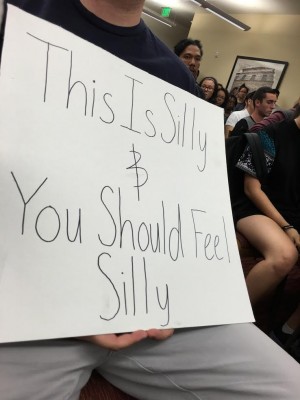
Accusations of anti-Semitism, calls for impeachment peppered contentious student government meeting
USC student president: ‘Our endowment comes from very rich alumni and … $100 million is not a lot’
The student government at the University of Southern California on Tuesday night discussed a controversial resolution calling on administrators to implement a long list of diversity initiatives, including adding a mandatory class addressing “critical race theory and queer theory,” but the contentious three-hour debate ended in a stalemate.
The group decided to postpone its vote until Nov. 10, but not before a student government leader was accused by peers of anti-Semitism. Also at one point a chant rose up among some members of the audience calling for a student government representative who has been vocally outspoken against the diversity resolution to be impeached.
“Impeach now, impeach now” echoed through the room, targeting student government member Jacob Ellenhorn after he voiced his opposition to the resolution. Ellenhorn, who is also Jewish and president of the USC College Republicans, has voiced major concerns about the cost of the diversity resolution. He has pointed out that a diversity course mandate, for instance, would cost each student $5,496, the price of one class at the private university.
What’s more, the resolution demands that administrators: hire a Title IX investigator; implement mandatory online ‘diversity and cultural competency  training’ of faculty; establish an endowed fund of $100 million for scholarships and fellowships for students from “underrepresented backgrounds”; and open two multi-cultural centers, among many other demands.
training’ of faculty; establish an endowed fund of $100 million for scholarships and fellowships for students from “underrepresented backgrounds”; and open two multi-cultural centers, among many other demands.
Other demands listed in the student government’s Diversity Climate Resolution call on administrators to hire a vice president and vice dean of diversity, equity and inclusion who will ensure all syllabuses “incorporate diversity, equity and inclusion components in course curricula.”
One student speaking out in favor of the resolution Tuesday night stated “it should not be the burden of the student to diversify their own education.” If approved, the non-binding resolution will be sent to administrators for consideration.
In debating the cost, student Matt Linton asked the student government if it was aware of how endowments work, and how taking $100 million out of the fund could hike tuition prices.
But Undergraduate Student Government President Rini Sampath said “our endowment comes from very rich alumni and I am very aware of how funding looks at this university, and $100 million is not a lot.”
Another heated moment of the meeting came when some students spoke out against the resolution by claiming that while it seeks to work against racism, sexism and discrimination of sexual orientation, it is hypocritical in that issues of anti-Semitism on campus have not been addressed.
Specifically, USC student Ariel Sobel, a former member of the student government, addressed the student government meeting by suggesting one of the resolution’s co-authors, director of the Women’s Student Assembly Shyann Murphy, is anti-Semitic. Sobel said that when planning an event addressing the abuse of Palestinian women in the Gaza Strip, Murphy was unwilling to include a representative arguing on the other side of the issue, stating she did not want to use funds for a Jew to speak. Murphy responded to the claim Tuesday night, but denied she said it, as she has done in the past.
But Sobel, along with a few other Jewish students, Leesa Danzek and Donna Emein, said during the meeting that they believe this apparent anti-Semitism needs to be addressed before a fair vote on a resolution can take place.
Other concerns over the resolution included its complete disregard for the notion of political diversity.
“It’s really ridiculous because diversity is so much more than a person’s identity or sexual orientation,” Ellenhorn told The College Fix before the meeting. “It involves different cultures around the world, and art and history and politics.”
Ultimately the group could not agree to vote on the matter.
“Many of us are in favor of the spirit of this resolution, we should of course create resources and promote diversity and acceptance, that is always important. Just because we have voted down on some of the amendments does not mean that we are against the resolution, it means that there are points that are not clear,” student Sen. Chris Fong said.
Another student senator, Eric Dubbury, agreed, stating: “We have to be critical and calculated and at the same time produce something that everybody is happy with.”
Sampath also addressed the Jewish students’ concerns, asking them to speak with her directly after the meeting.
Like The College Fix on Facebook / Follow us on Twitter





Please join the conversation about our stories on Facebook, Twitter, Instagram, Reddit, MeWe, Rumble, Gab, Minds and Gettr.